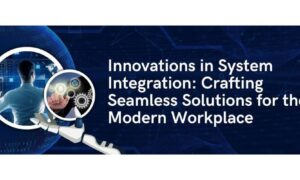Artificial Intelligence (AI) is more than a technological buzzword; it is transforming work and productivity. This article by Mohini Thakkar explores recent AI innovations that enhance workplace efficiency and examines their profound impact on the modern business environment, highlighting significant strides in AI applications that improve various productivity tools.
Revolutionizing Information Retrieval and Knowledge Management
The digital age offers immense information access but presents challenges in extracting relevant data efficiently. AI-driven solutions, such as semantic search, go beyond basic keyword matching to understand context and user intent. This improves search accuracy and relevance, delivering precise results. Consequently, employees save significant time that would otherwise be spent navigating through irrelevant data, boosting productivity and efficiency.
Natural Language Processing (NLP) allows employees to interact with databases using natural, conversational language, effectively bridging the gap between human communication and machine-readable data. This facilitates intuitive data querying and retrieval. Additionally, AI-powered summarization tools transform long, detailed texts into concise and actionable insights. This ensures that essential information is readily accessible, significantly enhancing data processing efficiency and reducing the need for prolonged reading or analysis.
Enhancing Content Creation and Editing
AI has transformed content creation through real-time writing assistance and automated drafting. These tools analyze text, offering context-aware suggestions to enhance quality and coherence. Advanced features go beyond grammar checks, detecting stylistic inconsistencies and recommending tone adjustments to meet professional standards.
AI-powered translation services provide accurate, contextually fluent translations, enabling seamless global team communication. Automated transcription and summarization capture key meeting points efficiently, allowing employees to focus on contributing ideas instead of note-taking.
Streamlining Task Automation and Workflow Management
Task management has seen significant enhancements through AI’s ability to prioritize and schedule tasks intelligently. By analyzing user behavior, historical data, and deadlines, AI systems optimize task sequences, enabling employees to concentrate on high-priority activities. This intelligent task prioritization reduces the cognitive load associated with manual planning, resulting in a more focused and productive workflow.
Robotic Process Automation (RPA), integrated with AI, automates repetitive data entry and form-filling tasks, minimizing manual errors and freeing up valuable time for more strategic endeavors. Additionally, AI-driven tools for email management can classify messages, draft contextually appropriate responses, and filter out less important emails, ensuring that professionals can dedicate their attention to essential communications.
Personalized Assistance for Enhanced Productivity
Personalized AI assistants are redefining workplace efficiency by providing context-aware recommendations and proactive task reminders. These assistants leverage user behavior analysis and work patterns to deliver timely suggestions and ensure that no important deadlines or tasks are overlooked. Such proactive support helps maintain a steady workflow and reduces the stress associated with task management during busy periods.
AI-driven scheduling assistants simplify the often complex process of coordinating meetings by analyzing participants’ calendars, considering time zones, and aligning individual preferences. This intelligent coordination helps optimize meeting schedules and maximizes productivity, ultimately streamlining collaborative efforts.
Navigating Challenges and Ethical Considerations
The integration of AI into workplace systems, while transformative, comes with its set of challenges. Data privacy and security are paramount concerns, as AI systems often have access to sensitive company information. Organizations must implement strict safeguards to protect against unauthorized data access and ensure compliance with relevant data protection regulations.
Bias in AI models is another significant issue. Since these systems learn from historical data, there is a risk of perpetuating existing biases, which can lead to unfair task allocations or evaluations. Regular audits and the application of fairness-aware algorithms are essential to mitigate these risks and foster equitable outcomes in the workplace.
Moreover, the “black box” nature of many AI systems poses transparency challenges. As these tools influence decision-making processes, it is crucial to implement explainable AI (XAI) practices that allow users to understand the logic behind AI-driven suggestions. This fosters trust and ensures accountability in AI-assisted workflows.
In conclusion, AI’s transformative impact on productivity tools is undeniable, streamlining workflows and enhancing human capabilities in unprecedented ways. Yet, as Mohini Thakkar stresses, organizations must prioritize responsible implementation to navigate ethical and practical challenges. By striking a balance between AI integration and human insight, businesses can create a future where technology amplifies creativity, fostering workplace innovation and sustainable growth.



































